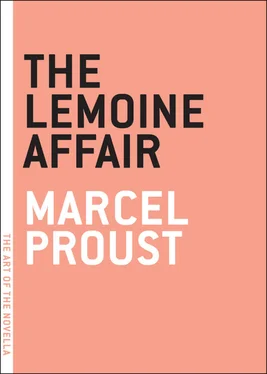But every coin has its other side. This man of unrivalled qualities, in whom the brilliant and the profound were equally prominent, this man, who could have been called delightful, who could be listened to for hours to the amusement both of others and of himself, since he laughed loudly at what he said as if he were both author and performer, to their benefit, this man had one vice: he was just as thirsty for enemies as he was for friends. Insatiable for the latter, he was relentless for the former, if one can put it that way, since after a few years had gone by, it was the same ones in whom he had lost all interest. He always needed someone to hate, to pursue, to persecute on the pretext of the most trifling remark — thus he was the terror of Versailles, since he did not in the least restrain his voice, which he employed to hurl the most grievous, biting, unjust remarks at whoever was not to his liking, as when he very clearly proclaimed about Diane de Peydan de Brou, esteemed widow of the Marquis de Saint-Paul, that it was just as unfortunate for paganism as it was for Catholicism that she was named after both Diana and Saint Paul. His choice of words always took people by surprise and made them tremble. Having spent his youth among the highest society, and his maturity among the poets, and having liked both circles equally, he feared no one and lived in a solitude that he made ever more austere by each former friend that he chased away. He was one of the close friends of Mme Straus, daughter and widow respectively of the famous musicians Halévy and Bizet, wife of Emile Straus, lawyer for a major charity; her admirable retorts are remembered by everyone. Her face had kept all its charm and would have been enough even without her intellect to attract all those who crowded round her. She is the one who, once in the Chapel of Versailles where she had her pew, when M. de Noyon whose language was always so affected and unnatural asked her if the music they were listening to didn’t strike her as octagonal, replied, “My dear sir, I was just about to say the same thing!”—as if answering someone who had uttered in front of everyone something that came naturally to mind.
One could fill a whole book if one recounted all that has been said by her and that should not be forgotten. Her health had always been delicate. She had taken advantage of this early on to dispense with the Marlys and the Meudons, so went to pay court to the King only very rarely, whereupon she was always received alone and with great consideration. People were astonished by the fruits and mineral waters she made use of all the time, without any liqueurs, or chocolate, and which had drowned her stomach; Fagon had not wanted to acknowledge this since his reputation was already dwindling. He called “charlatans” all those who prescribe remedies or who had not been received into the Faculty of Medecine; because of such notions he drove away a Swiss who could have cured her. In the end, as her stomach had lost the habit for strong food, and her body for sleep and long walks, she turned this fatigue into a distinction. Mme the Duchesse de Bourgogne came to see her and did not want to be shown beyond the first room. She received duchesses sitting down, who came to visit her just the same, since she was such a delight to listen to. Montesquiou never failed to visit her; he was also highly regarded by Mme Standish, his cousin, who came to that parvulo at Saint-Cloud, being the friend of longest standing of any to be admitted, and the one closest to the Queen of England, and most cherished by her; all the women there did not give way to her as should have been the case but was not, thanks to the incredible ignorance of M. the Duc d’Orléans, who thought little of her since her name was Standish, whereas in fact she was the daughter of Escars, of the house of Pérusse, granddaughter of Brissac; she was one of the greatest ladies in the kingdom as well as one of the most beautiful, and had always lived in the choicest society, of which she was the supreme elixir. M. the Duc d’Orléans also did not know that H. Standish was the son of a Noailles, of the branch of the Marquis of Arpajon. M. d’Hinnisdal had to tell him this. So we had at this parvulo the very remarkable scandal of Prince Murat, on a folding chair, next to the King of England. The stir that created resounded far beyond Saint-Cloud. Those who had the good of the State at heart felt its foundations being undermined; the King, so unversed in the reckoning of births and precedence, but understanding the stain inflicted on his crown by the weakness of having destroyed the highest dignity of the kingdom, attacked Comte A. de La Rochefoucauld on this subject in conversation, who was better versed in this history than anyone and who, ordered to reply by his master, who was also his friend, was not afraid to do so in terms that were so clear and so distinct that he was heard by the entire salon, where however a lively game of lans-quenet was being noisily played. He declared that, though much attached to the greatness of his house, he did not believe that this attachment blinded him or made him conceal anything from anyone, when he found that he was — not to say more — as great a lord as Prince Murat; nonetheless he had always given precedence to the Duc de Gramont and would continue to do so. At which the king forbade Prince Murat under any circumstance from taking anything higher than the title of Highness, or crossing the throne room. The only one who could claim this right was Achille Murat, because he owns sovereign prerogatives in Mingrelia, which is a State bordering territories of the Czar. But he was as simple as he was brave, and his mother, so well-known for her writings, whose charming mind he had inherited, had quickly understood that the substantial reality of his situation among those Muscovites was less than in the more-than-princely house that was hers, since she was the daughter of the Duc de Rohan-Chabot.
Prince J. Murat faltered a bit beneath the storm, just long enough to pass this unfortunate strait, but he wasn’t any more troubled than that, and we know that now, even to his cousins, lieutenant generals make no difficulty whatsoever, seeing no deep reason to do so, about addressing him as Your Highness and Sire, while the Parliament, when he goes to greet them, sends out its bailiffs with their staffs raised, an honor which Monsieur the Prince had so much trouble achieving, despite being a prince of the blood. Thus everything declines, everything is debased, everything decays as soon as it is born, in a State where the iron cautery isn’t applied right away to pretensions so that they cannot grow anew.
The King of England was accompanied by Lord Derby who was enjoying here, as in his own country, much consideration. He did not have at first sight that air of grandeur and reverie that was so striking in B. Lytton, who has since died, or the singular and unforgettable face of Lord Dufferin. But people liked him perhaps even more, by virtue of a sort of kindliness that the French completely lack and by which they are won over. Louvois had wanted him almost despite himself close to the King because of his abilities and his profound knowledge of the affairs of France.
The King of England avoided calling M. the Duc d’Orléans by that title when he talked to him, but wanted him to have an armchair, to which he did not lay claim, but took care to refuse. The princesses of the blood dined in a manner beyond their station by virtue of an indulgence that got talked about a lot but bore no other fruit. The dinner was served by Olivier, first steward of the King. His family name was Dabescat; he was considerate, beloved by everyone, and so well-known at the court of England that many of the noblemen who were accompanying the King saw him with more pleasure than the knights of Saint-Louis recently promoted by the Regent, whose faces were new. He preserved great loyalty to the memory of the late King and went every year to his memorial service at Saint-Denis, where, to the shame of forgetful courtiers, he was almost always alone with me. I have lingered for a moment over him, because by the perfect knowledge he had of his profession, by his kindness, by his connection to the highest people without being over-familiar, or servile, he had not failed to gain in importance at Saint-Cloud and to become a singular character there.
Читать дальше



![Marcel Proust - In Search of Lost Time [volumes 1 to 7]](/books/579170/marcel-proust-in-search-of-lost-time-volumes-1-to-thumb.webp)








